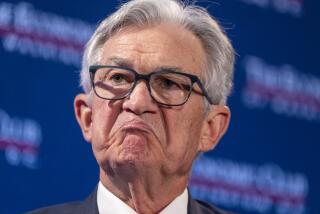Gentleman Bankers? Hah! Swiss Used ‘Paraguay’ Rules
- Share via
NEW YORK — It’s a good thing the Von Trapps weren’t Jews. Instead of singing “Edelweiss” as they fled into Switzerland, a Jewish family fleeing the Nazis would have been turned back by Swiss border guards honoring a secret pact with Adolf Hitler. Last year, Swiss President Kaspar Villiger finally admitted that the Swiss government stopped Jews fleeing the Holocaust at its borders and sent them back to certain death in Germany.
Ostensibly, the purpose of the agreement was to prevent a German invasion of Switzerland, but the record of Swiss banks since then lends credence to darker suspicions.
For decades, rumors circulated in Israel, Eastern Europe and the United States about secret bank accounts established in Swiss banks by Jews sheltering their assets from Hitler’s prying eyes. Since then, said the rumors, the banks held on to the vast bulk of this money, refusing to help impoverished relatives reclaim deposits made by family members killed in Hitler’s death camps.
Swiss banks profiteering from the Holocaust? Then lying to the president of the World Jewish Conference when he tries to investigate?
It’s ugly, but apparently true. After years of denials, the Swiss banking community now admits that, for the last 60 years, it has held some $34 million, and possibly more, deposited by Jews who were later murdered in German camps during World War II.
This is an improvement over the last search; from 1962 to 1973, Swiss banks claimed they could only find about $9 million. This sum was turned over to Jewish claimants and charities, but accusations remained that the banks were covering up large deposits and, in effect, making interest-free use of the money.
This appears to be just what happened--and the $34 million the banks admit to keeping is probably far below the true figure. A recent article cited detailed records of deposits at one financial institution showing about $29 million of potential Holocaust survivor money. Some estimates of missing funds runs into the billions.
Nazis, on the other hand, who stuffed their loot into Swiss banks have enjoyed access to their funds for decades; and investigations of Swiss banks have revealed a network of Swiss collaboration with Nazis, including Hermann Goering, right up through the end of the war.
In a recent settlement announced by the unlikely duo of Sen. Alfonse M. D’Amato (R-N.Y.) and World Jewish Council President Edgar Bronfman Sr., Swiss bankers agreed--after years of pressure--to facilitate efforts by Holocaust survivors and their relatives to recover funds from the banks. Accounts opened in the Holocaust period, which have been untouched for 60 years, will be audited to make it easier for relatives and heirs to reclaim money in numbered or secret accounts.
Bronfman’s efforts may or may not force the banks to disgorge all their Holocaust loot, but his campaign has shed light on a growing international movement against the once sacrosanct idea of secret banking.
Russian mafiosos, Colombian drug lords, U.S. crime bosses and dictators from around the world routinely abuse loopholes in international banking laws to shelter billions of dollars from taxes and prying eyes. Until recently, the world community turned a blind eye.
Third World kleptocrats like Ferdinand Marcos, Haiti’s Jean-Claude “Baby Doc” Duvalier and Zaire’s unspeakable Mobutu Sese Seko stashed hundreds of millions, even billions, in staid, respectable banking institutions. When their corrupt regimes finally crumbled, the people they defrauded were almost powerless to track and regain the loot.
It doesn’t make sense. Banks are supposed to be the guardians of the capitalist system. We depend on them for prudent management of money and assume these pillars of international society are firm upholders of property rights and the law.
Think again. In fact, banks work more like Paraguay under the late dictator Alfredo Stroessner. During his rule, any car left in Paraguay for 24 hours without Paraguayan papers could be legally claimed by a Paraguayan citizen. The result was a brisk hot-car business, as stolen cars were ferried across the rivers from neighboring Argentina and Brazil, with the thieves gaining legal title after 24 hours had passed.
Paraguay doesn’t work that way anymore, but significant parts of the international banking system still operate under Paraguayan rules. When a dictator or a drug lord makes a $10-million deposit, many bankers consider it their duty not to ask questions and, further, to protect their client’s privacy. With offshore banking centers in places like the Cayman Islands and Panama handling billions of dollars in secrecy, a significant amount of the world’s money operates under Paraguayan rules.
Secret banking isn’t all bad. Crooks aren’t the only people it helps. After all, those European Jews opened Swiss accounts in part to shelter money from Hitler’s attempts to confiscate Jewish wealth. Governments around the world have been known to oppress citizens; bank secrecy helps preserve individual freedom in a world of tyrants and thieves.
Traditionally, secret bank accounts served another purpose: protecting private money from the tax man. Here again, it’s not all bad. In many countries, the contest between government and taxpayer is almost a game, with both sides using fair means or foul in an age-old battle of wits. Taxes imposed by undemocratic or corrupt governments are not always legitimate, nor are individuals morally obliged to share intimate financial secrets with every nosy bureaucrat.
Last but not least, organizations like the CIA use secret banking for a wide variety of activities.
These factors once gave secret banking a legitimate role, but the age of secret banking may be ending. Honest businessmen don’t really need secret banking anymore. The globalization of world capital markets and the abolition of most capital controls allow legitimate investors and businesses opportunity to diversify and protect their holdings through normal banking channels.
On the other hand, there are powerful new reasons why international banking needs to be closely regulated and supervised. The rise of offshore banking and the explosion in cross-border lending and currency dealing makes the international financial system vulnerable to sudden, catastrophic crashes. To prevent this, international and national banking authorities must carefully monitor banks’ activities.
Meanwhile, the cost of bank secrecy is rising. Organized international criminal gangs in places like Russia and Colombia seek to penetrate and control legitimate financial institutions. Yakuza gangsters in Japan helped create the banking crisis that has brought the island nation its worst postwar economic crisis. Drug mafias and other criminal enterprises hide behind bank secrecy practices designed in a more innocent age of currency control evasion.
Slowly and painfully, the international community, led by the United States, is trying to get a grip on criminal misuse of the financial system. The Swiss were among the first to feel the heat. Such cases as the Philippine quest for Marcos’ assets forced the Swiss to amend their draconian bank secrecy law. Now Switzerland is no longer a good place to hide money--especially from the IRS.
The newer offshore havens are also feeling pressure. After the collapse of Pakistan’s notorious Bank of Credit & Commerce International stung depositors and embarrassed regulators worldwide, U.S. banking and legal authorities have become more aggressive in holding foreign banking entities to higher standards.
A global financial system ultimately needs global regulation, supervision and transparency. That such diverse figures as Bronfman, D’Amato and the IRS are on the same side in this suggests global banking reform is closer than you think.*
More to Read
Sign up for Essential California
The most important California stories and recommendations in your inbox every morning.
You may occasionally receive promotional content from the Los Angeles Times.













